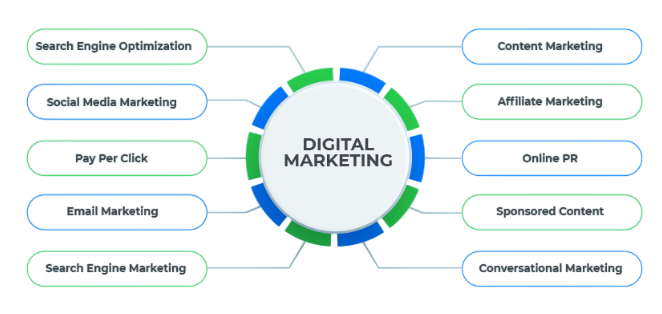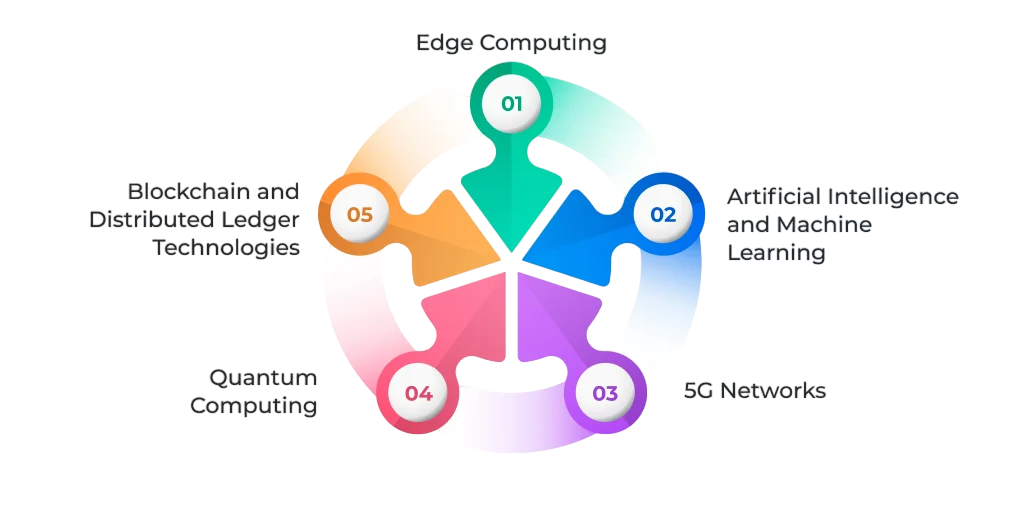
- Introduction
- Why Tracking Digital Marketing Trends Is Crucial
- Top Digital Marketing Trends in 2025
- Technologies Driving the Trends
- How to Adapt Your Strategy for New Trends
- Common Mistakes to Avoid
- The Future of Digital Marketing
- Conclusion
Introduction
Digital marketing is an ever-evolving space, shaped by technology, user behavior, and shifting industry standards. Staying ahead of the curve is no longer optional, it’s essential. In 2025, digital marketing is being redefined by AI, automation, privacy regulations, and increasingly intelligent platforms. This guide explores the most important digital marketing trends to watch and how your business can leverage them for maximum growth.Rapid technology breakthroughs, shifting customer behavior, and new platforms are all driving changes in the digital marketing landscape. Businesses that want to stay competitive, engage with their audience, Digital Marketing Training and optimize return on investment must stay ahead of digital marketing trends. What was effective a year ago, or even a month ago, might not be so today. Marketers need to change fast to stay relevant, from voice search optimization and AI-powered personalization to short-form video content and data privacy laws. Knowing these trends enables brands to improve client experiences, predict change, and develop innovative tactics in addition to staying up to date with the market.
Ready to Get Certified in Digital Marketing? Explore the Program Now Digital Marketing Online Training Offered By ACTE Right Now!
Why Tracking Digital Marketing Trends Is Crucial
Ignoring current Top Digital Marketing Trends means running outdated campaigns that waste resources and fall short of audience expectations. Following trends allows businesses to capitalize on new tools, tactics, and channels that enhance brand relevance and conversion potential. It improves ROI, boosts engagement, Digital Marketing Certification Process and keeps you competitive in a saturated digital ecosystem.Because the internet world changes so quickly, it’s critical to keep up with the latest trends in digital marketing to keep your strategy competitive and effective. Businesses may stay ahead of the curve and swiftly adjust to new possibilities by monitoring platform changes, consumer behaviors, and developing technology.

It aids marketers with better budget allocation, campaign optimization using the newest technologies, and anticipating changes in audience preferences. Additionally, by comprehending trends, organizations may enhance client engagement, develop new messaging, and stay relevant in a congested industry. In the end, monitoring trends is essential for boosting ROI, accelerating growth, and securing the future of your marketing initiatives.
Top Digital Marketing Trends in 2025
- AI-Powered Marketing: Artificial Intelligence is no longer a futuristic idea; it’s deeply embedded in every aspect of digital marketing. Tools like ChatGPT, Meta AI, and Google’s Performance Max are revolutionizing campaign creation, personalization, and optimization. From predictive analytics to content generation and audience targeting, AI reduces guesswork and increases efficiency. Marketers are using AI to analyze large datasets, automate bidding in ads, generate content, Top Digital Marketing Experts and even provide customer support via AI chatbots.
- Voice Search Optimization: With smart speakers, mobile voice assistants, and voice-enabled searches growing globally, voice search optimization is crucial. Unlike typed queries, voice searches are longer and more conversational. Digital marketers must now focus on natural language, local search optimization, and answering questions directly to appear in voice results. Schema markup and featured snippets play a larger role in improving visibility in voice searches.
- Video Marketing Evolution: Short-form video content continues to dominate in 2025. Platforms like TikTok, Instagram Reels, and YouTube Shorts offer huge organic reach and high engagement. Brands that incorporate snackable, vertical video content see improved performance, especially among Gen Z and Millennials. Live streaming, interactive video ads, and AI-generated videos are expanding how brands connect visually. Authentic, less polished videos often outperform traditional polished ads.
- First-Party Data and Privacy-Centric Marketing: With third-party cookies being phased out and strict data privacy laws like GDPR and CCPA in effect, marketers are shifting to first-party data strategies. Brands are collecting data through website behavior, email subscriptions, and app interactions. Consent-based marketing, zero-party data collection (data users willingly share), and improved transparency are essential. Building trust with your audience is now a competitive advantage.
- Influencer Marketing Maturity: Influencer marketing has matured into a full-fledged performance-driven strategy. In 2025, brands are favoring long-term partnerships with micro and nano influencers, whose niche followings yield higher engagement. Platforms now offer better tools for influencer discovery, vetting, and ROI tracking. Authenticity and alignment between brand and creator are more important than follower count.
- Hyper-Personalization: Generic marketing is out. Hyper-personalization uses behavioral data, AI, and CRM insights to deliver tailored experiences. From dynamic email content to website personalization and product recommendations, users expect brands to know their preferences. Predictive modeling and AI-powered segmentation allow marketers to deliver relevant content to the right person at the right time.
- Social Commerce Growth: Social media platforms are becoming full-scale shopping destinations. Facebook, Instagram, TikTok, and Pinterest have integrated checkout and shoppable post features. Influencer recommendations, live shopping, and one-click purchases are now key drivers of e-commerce. Brands need to integrate catalogs with platforms and create engaging, product-centered content to drive conversions within the social feed.
- Visual and Search AI Integration: Search engines are evolving to include visual and multimodal search capabilities. Google Lens, Pinterest Lens, and visual product recognition are changing how users find information. Marketers must optimize images and product visuals for visual search, using alt text, structured data, and high-resolution media. Search is becoming smarter, Digital Marketing Components and brands must adapt their SEO strategies accordingly.
- Conversational Marketing and Chatbots: Consumers expect real-time responses. AI-powered chatbots, live chat, and conversational interfaces are becoming standard across websites, apps, and social media. These tools improve customer experience, generate leads, and provide 24/7 support. In 2025, conversational marketing isn’t just about answering questions, it’s about guiding users through personalized funnels using dialogue and automation.
- Zero-Click Search Optimization: More than half of Google searches now end without a click. This is due to featured snippets, answer boxes, knowledge panels, and instant information delivery. To compete in a zero-click world, marketers must optimize for featured snippets, structured data, and concise, helpful content. Appearing in position zero (the top result) boosts authority, even if it doesn’t result in a click.
- Artificial Intelligence and Machine Learning: Core to personalization, chatbots, automation, and campaign optimization.
- AR/VR: Enhancing customer experience in shopping, gaming, and immersive storytelling.
- Blockchain: Improving transparency and data security, TensorFlow especially in advertising.
- 5G: Increasing mobile speed and supporting richer content formats like live video and AR.
- Marketing Automation Platforms: Tools like HubSpot, Salesforce, and Klaviyo streamline campaign execution and data integration.
- Audit Your Tech Stack: Ensure your tools support automation, personalization, and analytics.
- Invest in Training: Upskill your team on tools like Google AI, ChatGPT, Digital Marketing Training and GA4.
- Update Privacy Practices: Align your marketing strategy with data protection regulations.
- Focus on Omnichannel Experiences: Deliver a seamless user journey across platforms and devices.
- Create Agile Content Strategies: Prioritize adaptable formats like video and dynamic content that can be repurposed.
- Test and Optimize Constantly: Use A/B testing, user feedback, and analytics to refine performance.
- Increased use of AI and machine learning for personalized customer experiences.
- Voice search and smart assistants becoming more integral to search strategies.
- Growth of short-form video content on platforms like TikTok and Instagram Reels.
- Greater emphasis on data privacy and ethical marketing practices.
- Expansion of augmented reality (AR) and virtual reality (VR) Social Media Marketing Salary in marketing campaigns.
- Omnichannel marketing blending online and offline customer interactions seamlessly.
- Rise of influencer marketing and authentic brand partnerships.
- Automation tools streamlining campaign management and customer engagement.
- More focus on sustainability and social responsibility in brand messaging.
- Continuous evolution of SEO to adapt to new algorithms and user behaviors.
To Explore Digital Marketing in Depth, Check Out Our Comprehensive Digital Marketing Training To Gain Insights From Our Experts!
Technologies Driving the Trends

How to Adapt Your Strategy for New Trends
Looking to Master Digital Marketing? Discover the Digital Marketing Expert Masters Program Training Course Available at ACTE Now!
Common Mistakes to Avoid
A lot of companies have trouble with digital marketing because they make typical mistakes that make it harder for them to succeed. One common error that results in unfocused campaigns that don’t connect is failing to precisely identify target audiences. Ignoring analytics and data is another, which leads to lost chances to optimize tactics based on actual performance insights. Instead of fostering trust, bombarding prospects with sales pitches instead of offering real value can turn them off. Furthermore, SEO Keyword Research a common mistake made by marketers is to not adjust to emerging trends or technologies, which soon renders their efforts obsolete. Customers may become confused and brand identification may be weakened by inconsistent branding and message across mediums. Lastly, it is challenging to gauge success and defend marketing expenditures when goals and KPIs are unclear.
The Future of Digital Marketing
Preparing for Digital Marketing Job Interviews? Have a Look at Our Blog on Digital Marketing Interview Questions and Answers To Ace Your Interview!
Conclusion
Digital marketing trends are evolving faster than ever in 2025. From AI and personalization to privacy-first strategies and immersive content, businesses must stay current to remain competitive. These Strategy for New Trends are not just buzzwords; they reflect real changes in consumer behavior, technology, and communication. By understanding and adapting to these shifts, Digital Marketing Training can deliver more meaningful, measurable, and modern experiences to their audience.The future of digital marketing is dynamic and full of exciting possibilities, driven by rapid technological advancements and changing consumer expectations. Embracing innovations like AI, voice search, and immersive experiences will be key to staying competitive. At the same time, marketers must prioritize data privacy, authenticity, and sustainability to build lasting trust with their audiences. By staying adaptable and forward-thinking, businesses can harness these emerging trends to create more personalized, engaging, and effective marketing strategies that fuel growth well into the future.




